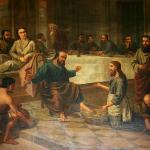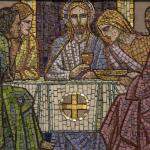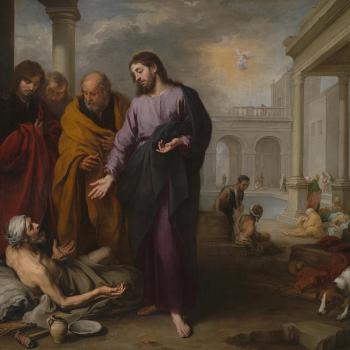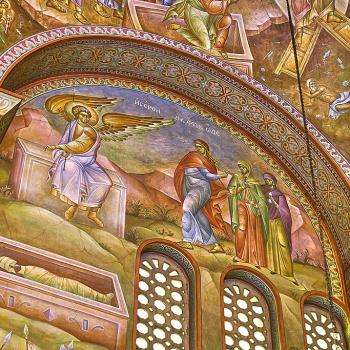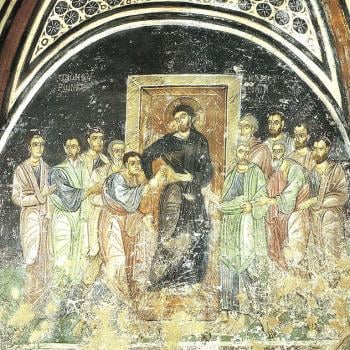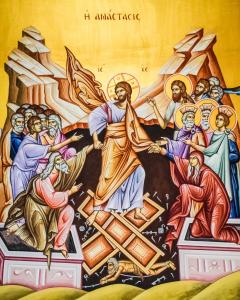
Christ is Risen!
“In the beginning was the Word, and the Word was with God, and the Word was God” (Jn. 1:1 RSV). In the new beginning is the Word, and the Word is with God, and the Word is God. “He was in the beginning with God” (Jn. 1:2 RSV). In the new beginning he is with God. Christ is risen! God has glorified him by raising him from the dead. And yet, he raised himself from the dead, showing that he is God. “No one takes it from me, but I lay it down of my own accord. I have power to lay it down, and I have power to take it again; this charge I have received from my Father” (Jn. 10:18 RSV). The Word is with God, the Word is raised by God, the Word is God.
“All things were made through him, and without him was not anything made that was made” (Jn. 1:3 RSV). even as all things are remade through him, so that nothing which has been made has not been remade by him. In his death and resurrection, the Word of God personally explored the full range of being. His descent into death took him to the very edge of being itself, next to the point of nothingness, where he then took all the sin of the world and disposed of it so that it was taken back to the nothingness from which it was formed. Then, having fulfilled his mission among the death, he ascended back to life and then to heaven, taking all the good which he found in the realm of being with him, so that all things can participate, in their own way, the glory of his resurrection. This is what Origen believed was indicated by Psalm 16:10 when it said, “For thou dost not give me up to Sheol, or let thy godly one see the Pit” (Ps. 16:16 RSV):
Explicitly, then, he says in this passage that Jesus would not see corruption and that the soul would not be abandoned in Hades, since he had descended in accord with the plan of salvation; because every region needed the visitation of Christ Jesus, including the place beneath the earth, he descended to Hades. For the one who ascended and the one who descended are the same, so that he might fill all things.[1]
Thus, “In him was life, and the life was the light of men” (Jn. 1:4 RSV), and in his glorious resurrection, he shares his life and light to all. Whatever harm sin has caused creation will be overcome and healed by him in the eschaton. The darkness of sin cannot hold him back. Even when he submits to death due to his long-suffering love for his creation, the darkness which death brings cannot overwhelm him; rather, it finds itself being overtaken by him. “The light shines in the darkness, and the darkness has not overcome it” (Jn. 1:5 RSV). The light shines in the darkness, the Word is found even in the depths of hell, but hell cannot and will not hold him down. The powers of hell, the powers of sin, are no match for him, even in his submission to them as he willingly descended into the realm of the dead. Even in his weakness, even when he does not struggle against the powers of sin and the death, he is not overcome but overcomes. Even in his weakness, even in his silent embrace of all that befalls him, he is God and without limit while sin, by its very nature, is limited, and will come to an end. He rises from the dead, having conquered death from within, showing to the world his eternal glory. It is this glory which he willing shares with us all. “But to all who received him, who believed in his name, he gave power to become children of God; who were born, not of blood nor of the will of the flesh nor of the will of man, but of God” (Jn. 1:12-13 RSV).
The resurrection is not some sort of resuscitation. Those who are resuscitated can and will die again. The resurrection is complete victory over death. “For resurrection, properly speaking, is into an incorruptible body.” [2] Those who are taken in by the Word and share in his resurrection will be raised from the dead, and like him, once they are raised from the dead, they will die no more. Death is overcome by the Word of God, and the grace of his resurrection is freely given out to all; anyone who should accept his grace will experience the resurrection of the dead after their own death. They will not experience mere restoration to temporal existence, but rather, they will share in eternal life, and experience eternal life as children of God. And this is because the Word, having gone through the whole of being, has found the good in all things, restoring that good to its original glory and beauty, as St. Maximos the Confessor wrote:
For the words, ‘leave the stump of the roots of the tree to grow in the earth,’ make it clear that the transgression did not utterly destroy the seed of nature nor its potentials for goodness, according to which, by resuming its growth, it will be led back through the resurrection to its former natural stature and beauty.[3]
Christ is risen from the dead! The Word of God which was with God in the beginning is with God in the new-creation, remaking all things in and through his passion and resurrection from the dead. The goodness of creation was never completely destroyed by the power of sin and death. But, if sin and death had not been overcome from within, if it had been allowed to play itself out without any action from God, then sin and death would have prevailed and all things would eventually have been corrupted and destroyed. Sin would have overcome all things, including itself, leaving only the nothingness which existed before creation. But this did not happen. God the Word came among us and revealed to us the glory of God; now only sin finds itself entirely exhausted. The Word now has a place for all things in the kingdom of God, so that all things can share in the grace of God, so that through that grace, God will be all in all.
Christ is Risen! Glorify him!
[1] Origen, Homilies on the Psalms: Codex Monacensis Graecus 314. Trans. Joseph W. Trigg (Washington, DC: CUA Press, 2020), 40 [Homily 1 on Psalm 15].
[2] St. Albert the Great, On Resurrection. Trans. Irven M. Resnick and Franklin T. Harkins (Washington, DC: CUA Press, 2020), 38.
[3] St. Maximos the Confessor, On Difficulties in Sacred Scripture: The Responses to Thalassios. Trans. Fr. Maximos Constas (Washington, DC: CUA Press, 2018), 179-80.
Stay in touch! Like A Little Bit of Nothing on Facebook.
If you liked what you read, please consider sharing it with your friends and family!


